Reflecting on the 2024 Asian Pacific Institute for Gender Based Violence National Summit
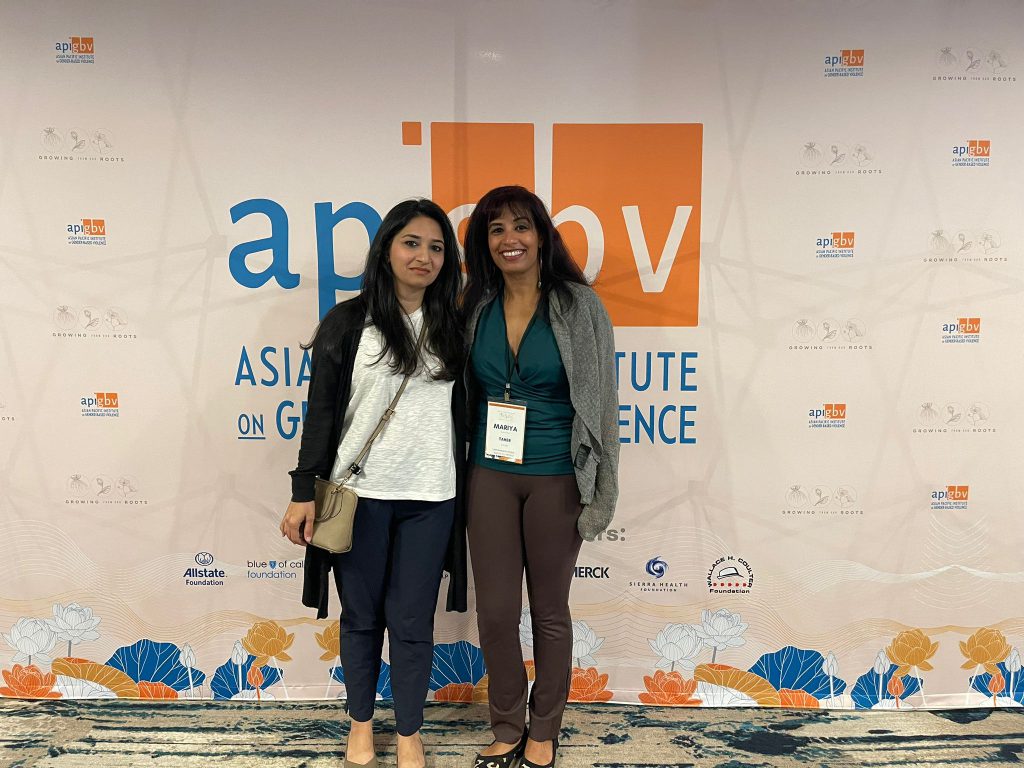
By: Samman Masud In August 2024, I, along with Sahiyo U.S. Executive Director Mariya Taher attended the Asian-Pacific Institute for Gender Based-Violence (APIGBV) National Summit in San Francisco, California. This year’s conference was aptly titled, “Growing from our Roots,” and focused on honoring the founding leaders who came together to form APIGBV in 1993, who have made landmark contributions to the field of gender-based violence and culturally specific advocacy since 1993. The three-day summit welcomed many attendees across the country, including grantees whose community-led, gender-based violence projects are funded by the ARP Support for Survivors Program. As one of the grantees, Sahiyo U.S. has used the funding to grow our Activists Retreat Project, a program that seeks to grow a network of anti-FGC activists and survivor-advocates doing critical advocacy work to end female genital cutting (FGC) in the U.S. The summit was brimming with positive energy with more than 400 attendees present as well as a great agenda, which welcomed speakers and guests from various organizations working in their respective ways to address the culturally specific needs of survivors, advocates and community members. Sharing a physical space, enjoying food together, and having vibrant conversations with folks dedicated to social justice work gave me a sense of community that I so badly needed in this moment, which was laden with anxiety from events both on the domestic and the international political front. And so, I didn’t miss the chance to also join the summer soirée hosted by Survivors, Organizations, Allies, Rising (SOAR),a member collective dedicated to addressing gender-based violence issues among South Asian diaspora in the U.S. We gathered at the beautiful Chandran Art Gallery on Geary Street in chilly San Francisco, had great food, and made plans about the future of SOAR with a focus on areas of improvement, such as increasing youth representation, the importance of data collection and project duplication in our advocacy efforts. There were many portions of the Summit I enjoyed including a workshop on effective storytelling in advocacy work, a session on diversity and equity pitfalls in hierarchical organizations, and a difficult but important conversation on male engagement efforts in gender-based violence work. The discussions in these sessions provided important reminders, likethe need to “keep the lens on the survivor”, a goal that sometimes gets lost due to many challenges that arise with routine operational and administrative work in organizations. Recurring discussions about intersectionality brought to the forefront critical issues in gender-based violence work, for example, the need to fund flanguage access resources to help campaigns addressing communities of color. Stressing the importance of \ survivor-led efforts, and keeping the focus on the growing, intersecting needs of diverse communities in the U.S., helps to improve our work, as I hope to bring more language access to Sahiyo. One way of accomplishing this is hosting a community call in Hindi or Gujarati with members of Bhaiyo, our male engagement initiative at Sahiyo, a goal we hope to achieve later this year. There were many great gatherings and conversations at the Summit, but for me, the highlight was listening to API-GBV Executive Director, Monica Khant in her fireside chat with activist and journalist Helen Zia. A key figure in the Asian American movement and a gender justice advocate, Zia talked about her earlier work in the civil rights movement. Sheemphasized the need to “humanize Asian Americans,” and touched on being Asian in America, which brings with it intersecting forms of oppressions like racism and sexism. As an activist working to address FGC among South Asian community members in the U.S., I could relate very well to Zia’s discussion of the challenges that intersecting dynamics can present to survivors and community members addressing gender-based violence. Zia also stressed the importance of drawing lessons from other marginalized communities in the U.S., such as Black communities that rely on each other in times of crisis. She also emphasized the importance of continuing solidarity work with said communities to solidify the movement and address the root causes of universal, systemic causes of oppression: male privilege and the patriarchy. With that, I realize that gender-based violence work is hard, and gets increasingly difficult given other rapidly changing dynamics of the world. Being in community and listening to the success stories of achievements through solidarity makes the work a little bit easier, and the journey more worthwhile.
Upcoming conference on ending FGM/C in Canada
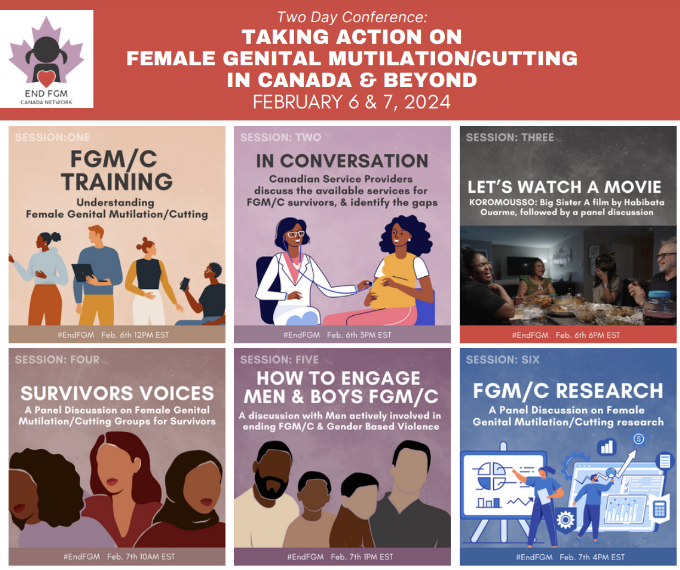
On February 6th & 7th, the End FGM Canada Network will be hosting a conference, Taking Action on Female Genital Mutilation/Cutting in Canada & Beyond. This conference aims to observe February 6th, The International Day of Zero Tolerance for Female Genital Mutilation, through two days of collective action. Sahiyo U.S. Executive Director Mariya Taher will be a panelist for the fourth session: Survivors Voices: A Panel Discussion on Female Genital Mutilation/Cutting for Survivors on Feb 7th at 10 am EST. The Network invites participants to join in taking a deep dive into the issue of female genital mutilation/cutting (FGM/C) and develop the understanding and skills needed to support FGM/C survivors and contribute to Canada’s anti-FGM/C movement. Learn more about the conference here.
Tufts University hosts panel to raise awareness of FGC
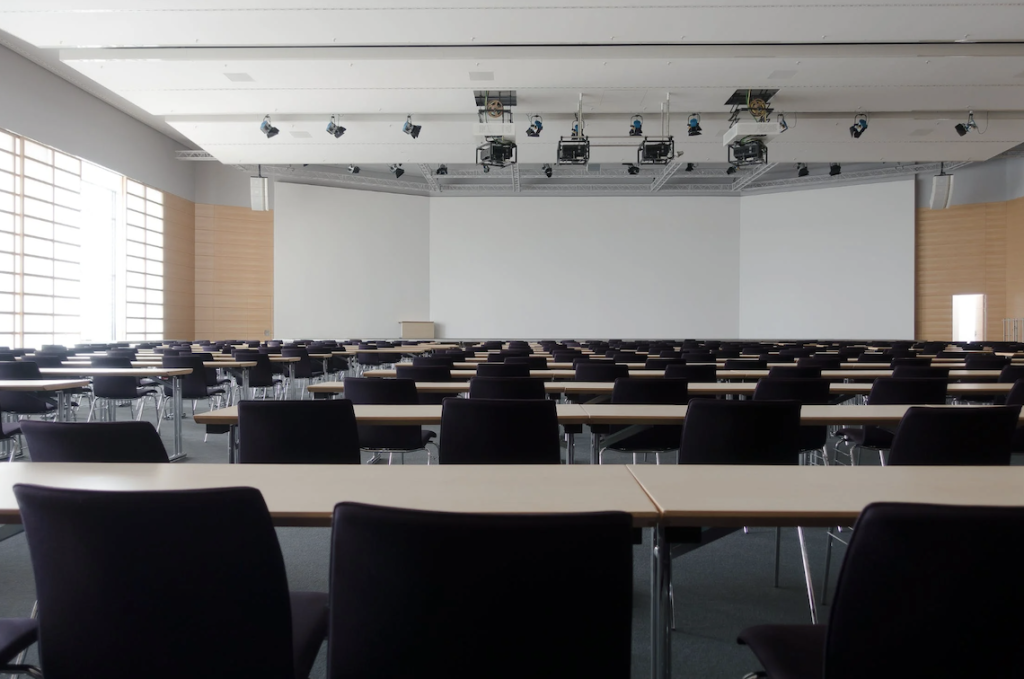
On April 14th, Sahiyo U.S.’s Mariya Taher was invited to speak at a panel discussion on female genital cutting (FGC) by Women in International Relations (WIIR), an organization that is part of Tufts’ Institute for Global Leadership at Tisch College. WIIR hosted a panel on FGC as part of a broader conference on the topic of public health and women’s healthcare. Other panelist included Aminata Bah, Copresident of the End FGM European Network, and Dr. Salma Abdalla. WIIR aims to explore opportunities for women studying international relations at Tufts, as well as to create a space of dialogue and empowerment through mentorship, networking, and academic discussions and events on women’s rights issues.
Sahiyo presents at the MACA Conference
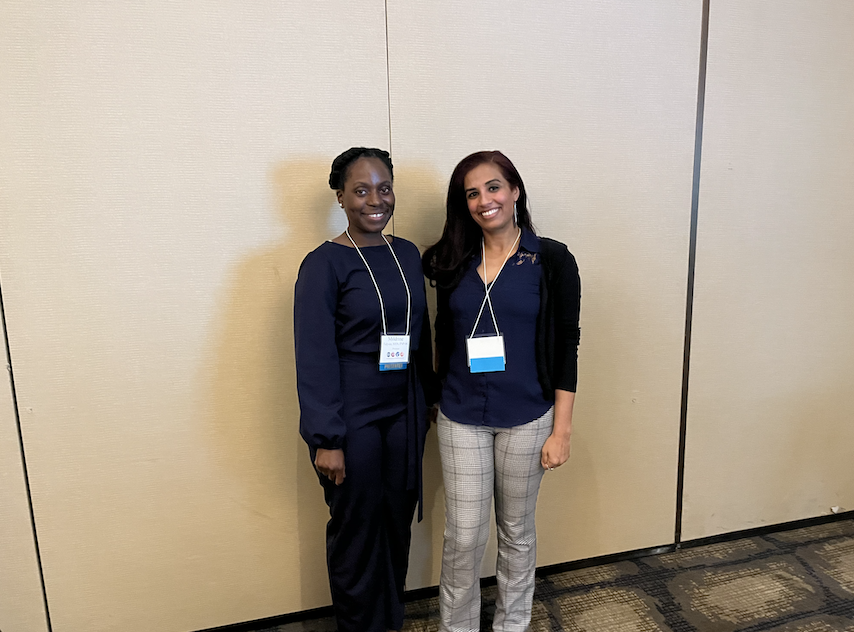
On May 10th, Sahiyo presented at the 12th Annual Massachusetts Children’s Alliance Conference. In attendance were over 200 multidisciplinary child abuse professionals from across the state. Sahiyo cofounder, Mariya Taher, partnered with Mildrine Tulysse, a Massachusetts Pediatric Sexual Assault Nurse Examiner, to provide information about the realities of female genital cutting (FGC) in the state of Massachusetts. The training they provided was done to increase education and awareness of FGC within the United States, provide resources to better understand how to give high-quality care to survivors; and empower frontline professionals to develop culturally competent and trauma-informed services and resources to survivors of FGC.
Sahiyo speaks at the ABA International Law Section Annual Conference

On April 28th, Sahiyo was invited to take part in a panel discussion at the 2022 ABA International Law Section’s Annual Conference being held in Washington D.C. The panel brought together a legal practitioner, journalist, and activist working towards gender equality and the elimination of FGC to discuss legal tools and other measures that have been adopted to end this practice worldwide. Program Chair: Sandrine Siewe, Georgetown Law, Washington, DC Moderator: Bayor Chantal Ngoltoingar, Anti FGM Advocate Speakers: Isabella Micali Drossos, Senior Counsel, World Bank Shelby Quast, Robertson, Quast & Associates, US End FGM/C Network Giselle Portenier, Journalist, End FGM Canada Network Mariya Taher, Cofounder, Sahiyo, US End FGM/C Network During the event, speakers introduced the World Bank’s Fifth edition of the Compendium of International and National Legal Frameworks. The speakers also highlighted Federal- and state-level policy and law around FGC in the United States, and spoke to measures and programs that can help those impacted by FGC recover from the harms caused by this practice. Moreover, the panelists discussed the role of a bottom-up-oriented strategy, such as active and intergenerational dialogues within communities, for finding solutions to end FGC.
Sahiyo team speaks at The Pre-Summit of#EndFGM Global Conference
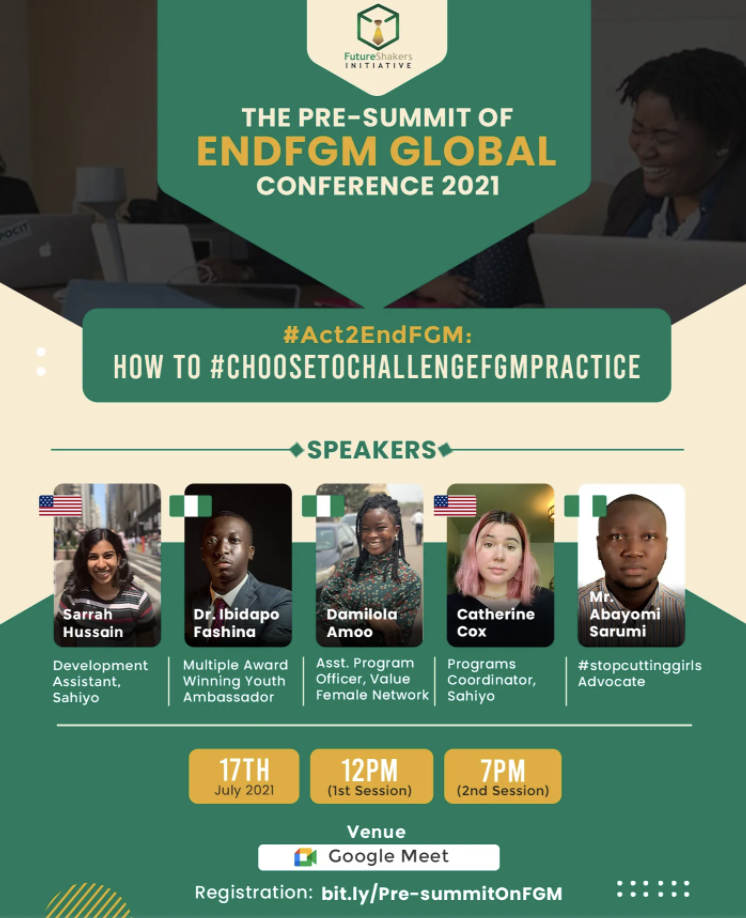
On July 17th, Sahiyo’s Development Assistant Sarrah Hussain and Programs Coordinator Catherine Cox spoke at a panel discussion on female genital mutilation/cutting (FGM/C) hosted by the Future Shakers Initiative (FSI). This event, The Pre-summit of #EndFGM Global Conference, was the prelude to the conference. The summit was an online webinar convening international speakers and advocates to share ideas and prepare for the in-person conference. As part of The Pre-summit of the #EndFGM Global Conference, Hussain and Cox were joined by Dr. Ibidapo Fashina, Abayomi Sarumi, and Damilola Amoo, moderated by FSI founder, Tobi Olanipekun. During the two-session event, this group of activists and change-makers convened over Google Meet to discuss their roles in challenging FGM/C, and how to build global bridges to advocate for the end of the practice. This inspirational panel of speakers explored the health consequences of FGM/C; the justifications and social norms underpinning the practice; and how we all can become better activists in empowering our communities to end the practice. During the event, the speakers had the opportunity to answer critical questions such as, “What human rights does FGM/C violate?” and “How can young people challenge FGM/C?” Our team highlighted how FGM/C is practiced on young girls without consent and is a violation of the rights of girls. FGM/C also violates a person’s rights to health, security, and physical integrity, the right to be free from torture and cruel, inhuman, or degrading treatment, and the right to life, as this practice can result in death. We additionally stressed Sahiyo’s belief in the power that storytelling can create change, spark healing, and inspire individuals and communities to advocate for the abandonment of FGM/C. We believe that highlighting and amplifying the voices of survivors can be a powerful way to challenge FGM/C, the norms of silence and shame that often keep women from speaking out, and to give space for survivors to heal. During the question and answer session at the end of the event, one guest asked how modern technologies are being utilized to help end FGM/C. Sahiyo speakers highlighted the initiative, Mumkin, an app that was created by Sahiyo’s co-founders Priya Goswami and Aarefa Johari. This is an app that uses artificial intelligence to help activists practice having difficult conversations around FGM/C. We encourage all of our allies to download this app in order to help them practice having critical conversations around FGM/C. The Pre-summit of the #EndFGM Global Conference was an eye-opening exploration of the many issues and concepts surrounding FGM/C, as well as the need for global connections and idea-sharing to foster a global community dedicated to ending FGM/C and all forms of violence against women and girls. The #EndFGM Global Conference will be taking place in-person in Nigeria later this year. If you are interested in having a member of Sahiyo speak at an event at your institution, please email our team: info@sahiyo.com. You can also fill out our request for an outreach presentation form here.
Sahiyo, RAHMA and HEART discuss HIV, FGM/C and sexual health during workshop
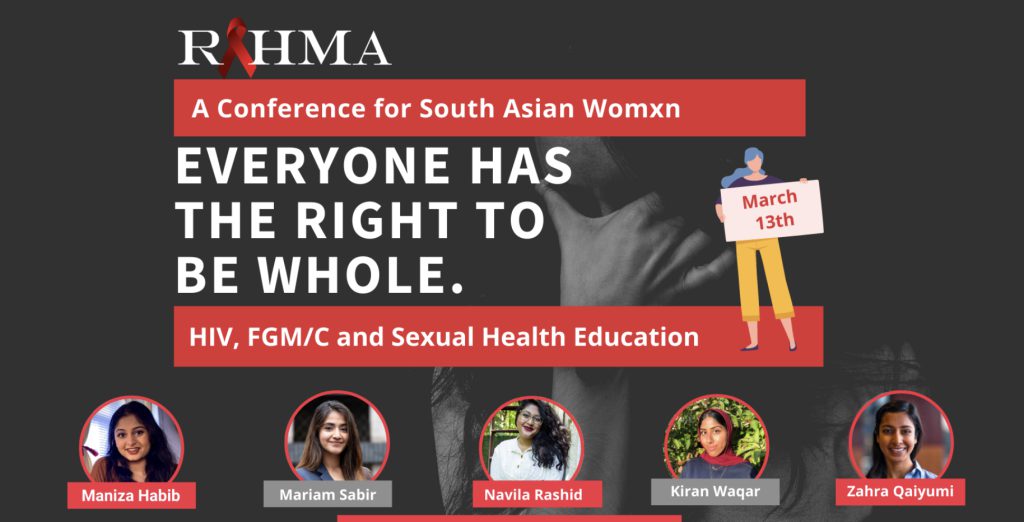
by Zahra Qaiyumi Sahiyo partnered with RAHMA and HEART on March 13 to host the My South Asian Sisters (MYSAS) workshop. The conference engaged women of South Asian descent in Washington, D.C. to take control of their sexual health, embrace their diverse needs, develop a healthy outlook on body positivity, become effective advocates against female genital mutilation/cutting (FGM/C) and gender-based violence (GBV), and address HIV stigma. MYSAS was funded through a grant from the D.C. Mayor’s Office of Asian American and Pacific Islander Affairs. The day-long event brought together South Asian women working in social work, public health graduate students and those completing undergraduate studies, among others. Speakers included Maniza Habib, Mariam Sabir, Navila Rashid, Kiran Waqar, and myself. The MYSAS workshop was interactive, with ample opportunity for participants to share thoughts, ask questions, and learn from one another. Sharing knowledge about FGM/C and planting seeds for others to become involved with work on gender-based violence was one of the most inspiring parts of the workshop. It can be challenging to find spaces for South Asians to come together and focus on topics affecting the South Asian community as a whole. Workshops like these allow for collaboration between organizations and individuals who are working to empower South Asian communities, and create opportunity for projects and programming that might otherwise not have been possible. As a workshop host, I spent most of my time-sharing knowledge about FGM/C, including existing research and statistics, as well as personal experiences and advocacy work. However, one of the most salient takeaways from this workshop resulted from a conversation with a participant about inclusive language. There is a general lack of data surrounding who and how many people undergo FGM/C. This includes individuals that do not identify as female and are FGM/C survivors. This prompted a discussion about transitioning to language that focuses on body parts rather than gendering the FGM/C survivor. For example, we discussed utilizing “person with a uterus/vagina/vulva.” This and other conversations during the MYSAS workshop illustrate the importance of programming that brings together those working in the GBV space so they may learn from and collaborate with each other.
Op-Ed: A Global Platform to End FGM/C
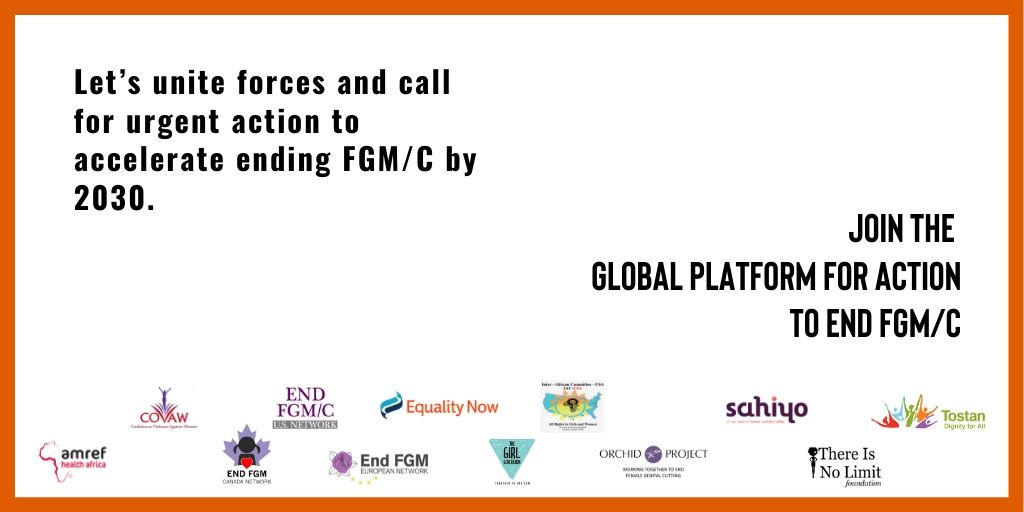
We must accelerate an end to FGM/C. Every 11 seconds a girl somewhere in the world will go through female genital mutilation/cutting (FGM/C.) The procedure is often extremely painful, and carried out with a crude, unsterilized instrument and without anesthesia. Every 11 seconds. FGM/C has no medical benefits, and often has disastrous effects, including a lifetime of psychological trauma, difficulty urinating and menstruating, maternal and child mortality, lack of sexual fulfilment, and sometimes, most tragically, the loss of a girl’s life afterwards. This violation of a girl’s fundamental human rights has no place in the world today. It must stop. Now. Last June at the Women Deliver Conference held in Vancouver, for the first time, global FGM/C activists from Africa to Europe, from Australia to Asia and to North America; women and men, civil society organisations, champions, survivors, and grassroots representatives, all came together to unite voices around a global call to action to end FGM. Together, we are asking, no imploring, the international community to prioritize the ending of FGM/C worldwide, in the same way it responded to other urgent global issues such as HIV/AIDS. It’s estimated that 200 million women alive today are survivors of FGM/C. It is practiced on every continent except Antarctica. There’s no religious requirement for it, and it is practised in Muslim, Christian, Pagan, and even some Jewish communities. There can be little doubt that female genital mutilation/cutting is among the worst human rights violation perpetrated against women and girls in the world today. The practice continues because it is a social norm held in place by the expectations of whole communities–women, men, elders, even politicians. And it continues to be a taboo subject, hidden behind a wall of silence around the world. This too must stop. Next week, at the International Conference on Population and Development (ICPD) in Nairobi, where gender equality and reproductive and sexual rights are high on the list of priorities, there is a tremendous opportunity to shine a giant light on the issue of FGM/C and move it firmly to the top of the agenda where it belongs. Kenya’s President Uhuru Kenyatta, sitting beside Canada’s Prime Minister Justin Trudeau at Women Deliver in Vancouver just a few months ago, courageously committed to ending FGM/C in Kenya by 2022, eight years ahead of the Sustainable Development Goal of 2030. It’s an ambitious promise, a challenging target for sure–but it shows leadership, it shows vision, it shows a commitment to the idea that girls’ human rights must be cherished, must be protected. We hope that other governments around the world will follow and commit resources, improved data and research, laws and policies to protect girls at risk, and support for survivors, so that together we can end FGM/C around the world. The End of FGM/C is not just the end of a violation of girls’ human rights, it is also the start of increased economic development for practicing communities and has the power to be completely gender transformative. It is a proven fact that when girls and women fully participate in the economy of a country, it results in significant economic advancement. And so, we ask the global community at the ICPD to join us, to work together on a multi-pronged approach to end FGM/C by 2030. Whole communities must be mobilized and empowered at the grassroots level. Women and men, girls and boys, health workers, traditional and religious leaders, all have to be empowered to embrace the end of this harmful traditional practice. We have to address the root causes of gender equality at the community level; we have to listen to and support grassroots organizations that are working in this field; we need an integrated, intersectional approach to ending FGM/C, recognizing the connections with other forms of gender-based violence and linking with existing movements. We have to work with governments to respond to the adaptations to this violation of girls’ and women’s human rights, include medicalization, cross-border practices, and lowering the age of mutilation/cutting. Accordingly, we call on all stakeholders to prioritize resources towards grassroots and community led programmes, and to make funding more flexible, sustainable, and accessible. Whatever our religion, our gender, our ethnicity, –the time has come for every one of us and all our governments to deploy every tool at our disposal to end this harmful practice. FGM/C is a human rights emergency that continues to exact untold harm on a daily, hourly basis. Together we can end it. Sign up to the Global Platform for Action to End FGM/C today at www.ActionToEndFGMC.org. This call to action has been endorsed by Amref Health Africa, Coalition on Violence Against Women, End FGM Canada Network, End FGM European Network, Equality Now, Orchid Project, Sahiyo, The Girl Generation, The Inter-African Committee on Traditional Practices, The US End FGM/C Network, There Is No Limit Foundation and Tostan.
Global Call to Action From “Uniting forces to make female genital mutilation/cutting a practice of the past: A gathering for global civil society actors”

On June 2, 2019 in Vancouver, Canada, civil society organisations, champions, survivors and other grassroots representatives came together at Women Deliver 2019 to unite voices around a global Call to Action to end female genital mutilation/cutting (FGM/C). The pre-conference was an unprecedented gathering as a sector working globally across the issue to discuss what is needed to accelerate ending FGM/C by 2030. The event put grassroots voices at the centre and worked to strengthen our unified community of practice to support the achievement of Sustainable Development Goal 5.3. (eliminate all harmful practices, such as child, early and forced marriage and female genital mutilation). “Uniting forces to make female genital mutilation/cutting a practice of the past: A gathering for global civil society actors” involved more than 100 participants in Vancouver. More than 270 additional participants shared their expertise and experience through an online survey. The event was co-ordinated through a core group of globally representative organisations that managed logistics: Amref Health Africa, Coalition on Violence Against Women, End FGM Canada Network, End FGM European Network, Equality Now, Orchid Project, Sahiyo, The Girl Generation, The Inter-African Committee on Traditional Practices, The US End FGM/C Network,There Is No Limit Foundation and Tostan. Participants in Vancouver endorsed the following Call to Action: PREAMBLE FGM/C is a violation of the human rights of women and girls and must be ended in all its forms We need to make FGM/C a global priority, in the same way the global community responded to other global epidemics, such as HIV/AIDs SUPPORTING CHANGE FROM WITHIN – CHALLENGING SOCIAL AND GENDER NORMS We share a vision of a world free from FGM/C and will work in partnership with each other, all communities, governments, donors, multilateral bodies and others to end the practice by 2030 in line with the SDGs Whole communities must be mobilised and empowered at the grassroots level if we are to end FGM/C – women and girls, men and boys, traditional and religious leaders, health workers Ending FGM/C requires addressing the root causes of gender inequality at the community level, including gender stereotypes, unequal power relations, and negative social norms STRENGTHENING THE EVIDENCE BASE THROUGH CRITICAL RESEARCH Fill the knowledge gap on FGM/C survivors’ specific needs, impact on economic empowerment, and behaviour change around emerging trends such as medicalisation and lower ages of cutting Use community-based participatory approaches within research efforts and ensure that research results and data are synthesised for communities to use Create, test, and implement standardised universal indicators that are informed by context specific measures and demand country-level reporting IMPROVING WELLBEING VIA SUPPORT AND SERVICES FOR SURVIVORS More support is needed for survivors in various forms, including security and protection for survivors, targeted research and resources to enable health and emotional wellbeing Enable the transformative power of survivors and survivor-led networks through support to connect with each other, other gender-based violence movements and capacity build ADDRESSING EMERGING TRENDS AROUND FGM/C We need an integrated, intersectional approach to ending FGM/C recognising the connections with other forms of gender-based violence and linking with existing movements We are committed to working with religious leaders, health workers and governments to respond to adaptations to the practice which continue to violate women’s rights, such as medicalisation, cross-border practices, and lowering the age at which FGM/C is carried out INCREASING RESOURCES TO ACHIEVE THE GLOBAL GOAL We call on all stakeholders to prioritise resources towards grassroots and community-led programmes. Funds should be more flexible, sustainable and accessible for communities and grassroots and capacity building should be provided as well as networks Investment is needed in better research into what is working and what is not to end FGM/C. This research needs to be participatory and involve multiple stakeholders and should be made available and accessible We are focused on coming together and working collaboratively to address what existing gaps there are, what are the costs of FGM/C, and what do we need to end this globally See call to action as PDF here. Further Women Deliver blog posts: Joint Press Release: Ending FGM/C BY 2030: Uniting forces to make FGM/C a practice of the past Multiple events on FGC hosted at Women Deliver in Vancouver
Looking Back: Sahiyo at CSW/MALA’s March 2019 Event
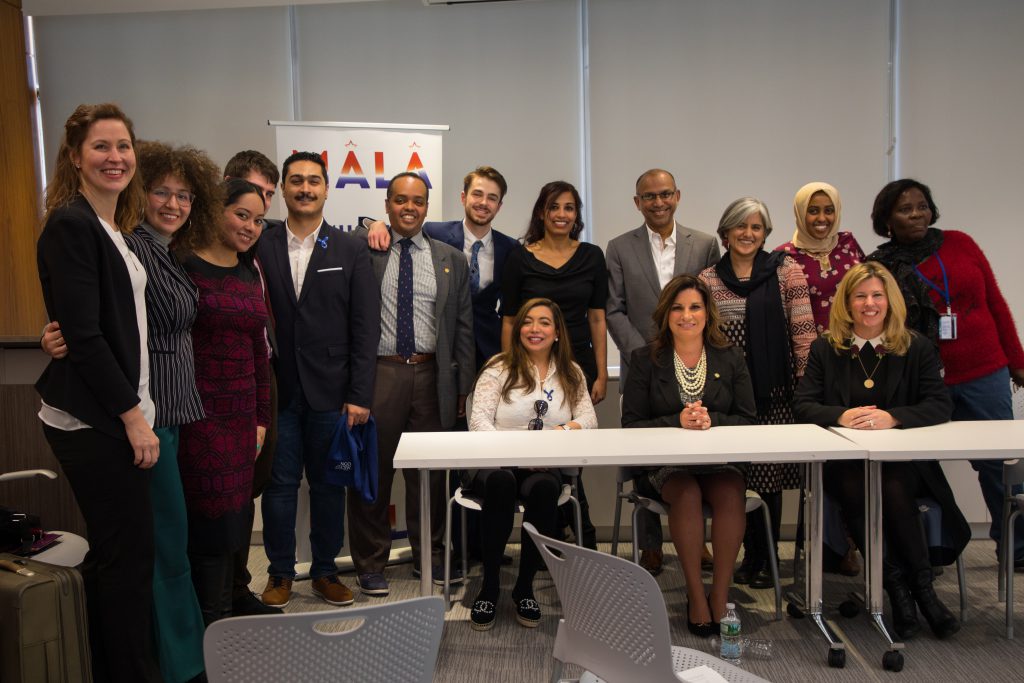
On March 18th 2019, the Muslim American Leadership Alliance (MALA) hosted a parallel event on “Addressing FGM in the USA: Safeguarding Survivors and Protecting Victims“ at the UN Commission on the Status of Women 63rd Session in New York. The panel took place at the UN Church Center. The panel convened survivors, policy makers, non-profit leaders, and community organizers to facilitate the dialogue on what necessary steps are needed to ensure ‘zero tolerance’ towards FGM for both survivors and at-risk women and girls. Speakers included: Mariya Taher, Sahiyo Cofounder Mary Franson, Minnesota House of Representatives Andrea G. Bottner, J.D., Senior Advisor- Independent Women’s Forum Asad Zaman, M.D Zehra Patwa, WeSpeakOut Co-Founder and Sahiyo Vice-Chair of the U.S. Advisory Board This panel analyzed the practice of FGC in the United States through a medical, psychological, and legislative lens. The panelists collectively suggested a variety of approaches to bringing communities together to gain knowledge and organize. The event was incredibly popular, with the room at full capacity and more guests listening from the hall. These types of events are essential towards our progress in creating a world without FGC.
